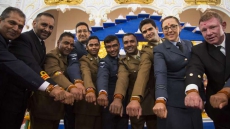The US connection with Afghanistan and Central Asia is not a 20th century development but dates from century before it when a most singular man became the first of his countrymen, or even the first westerner for that matter, to travel through interior Asia, participate in Afghan power politics, go on to serve Maharaja Ranjit Singh and his descendants and observe the fall of the Sikh empire.
But the reason that the life and the career of Alexander Houghton Campbell Gardner (1785-1877) is not known widely because it is seems so "outrageously improbable", says acclaimed British historian John Keay who has written the first comprehensive biography of this American soldier of fortune who ended his days as a landlord in Jammu and Kashmir under the Dogra rulers.
It has been thought to be part of fantasy literature than serious history and some earlier historians dismissed Gardner as a "plagiarist, fantacist, liar and scoundrel", he said at a session titled "The Tartan Turban: A Scots-American at Ranjit Singh's Court" during the Jaipur Literature Festival's third day on Saturday.
Keay, who said he had come across the story of Gardnet -- known in his Asian stint as Gordana Khan and who never returned home -- earlier on but restrained himself from mentioning it in his earlier works, as it had raised doubts in his mind.
"The story was too good to ignore but it seemed dodgy; so I left it out," he said, adding that the term "maverick" seemed specially coined for the colonel (as he was appointed by Maharaja Ranjit Singh).

However, Keay said he returned to the topic when he was approached by a new Sikh-run publishing house to revisit the life of Gardner -- a striking figure clad in a tartan suit and turban, with a flowing beard, 14 wounds, including a hole in his neck which necessitated wearing iron forceps whenever he had to eat or drink something - and his role and account of the fall of Ranjit Singh's kingdom within a decade of the Maharaja's death in 1839.
Speaking about the book for the first time to any audience, Keay noted that he was more inclined to believe Gardner's story when research found out that the latter part of his life in Lahore was so well authenticated in contemporary sources that one could view the earlier improbable and less-detailed part more favourably.
This covered Gardner's service with Habibullah Khan, nephew of Emir Dost Mohammed Khan, (a desire for whose ouster led to the ill-advised and ill-fortunate British expedition in 1842), his marrying an Afghan princess and siring a son (both killed soon), his flight across the Hindu Kush, Pamirs and the Karakoram to reach Turkestan and Tibet, visiting Ladakh and Kashmir, and eventually ending up in the service of Ranjit Singh, whose artillery he managed.
Gardner's services were later transferred to the Chief Minister Dhian Singh, a Hindu Dogra (and elder brother of Maharaja Gulab Singh, who would buy Kashmir from the British), and after the British finally took over Punjab, he had to relocate to Kashmir where he was granted an estate, said Keay.
It was here much later that Gardner came to the attention of British officials again and told his story, which had both supporters and opponents, he added.

On doubts whether Gardner, who claimed to be born in Wisconsin, was really an American, Keay said that if he had been a British deserter as some of his detractors claim, then the British administration in India would have never let him live in peace. Also Gardner was visited by Americans, including a nephew of famous poet Henry Wadsworth Longfellow, who would have caught on if he was not one of their countrymen.





